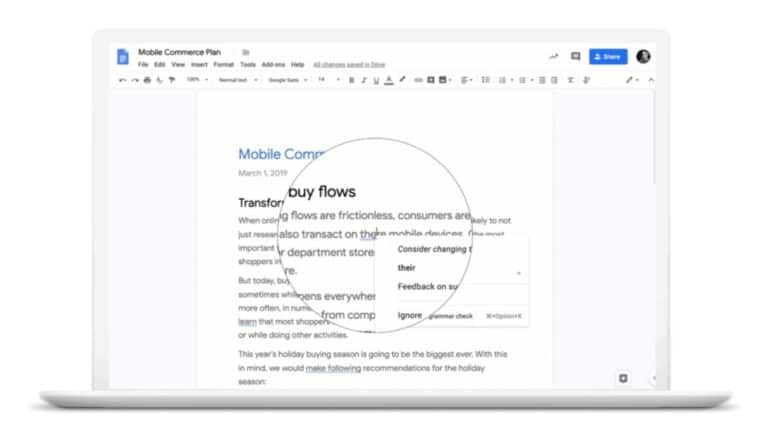Today, Google is bringing a new feature to its G Suite tools: Grammar Suggestions. It uses machine learning to detect grammar errors and recognizes stylistic errors. The function was already available within an early adopter program of Google since July, but is now being rolled out to everyone.
Grammar Suggestions not only helps users to improve their texts, but also includes material that allows people to learn when they need to use a or an, for example, there of their and so on. The function also corrects spelling mistakes and misused phrases. In short: a non-run text must start running with this.
Correcting documents
If you have to create documents every day and run into deadlines, grammar won’t be the first thing you do, writes product manager Vishnu Sivaji of G Suite in a blog post. And if that is the case, it seems as if everyone has their own opinion about what is and what is not correct.
Users of G Suite will see any errors marked with blue stripes below the words. By right-clicking on it, users can accept the recommendations. At the same time, additional suggestions appear on the screen. Even more suggestions appear when a complete spelling and grammar check is carried out via the Tools menu.
Cooperation with linguists
According to Sijavi, Google has worked hard to get the Grammar Suggestions in order. The company worked with linguists to build a machine learning model that gets the complexity and nuance of grammar just right. Grammar may vary by language, region, style and more. We have worked very closely with linguists to decipher the rules for the machine learning model and use that as a basis for the automatic suggestions that our machine learning offers you.
The Grammar Suggestions will be rolled out to G Suite Basic, Business and Enterprise from March 5. It can take up to 15 days for the feature to be available to everyone. G Suite for Education, Enterprise for Education and Nonprofits will not be available for the time being.
This news article was automatically translated from Dutch to give Techzine.eu a head start. All news articles after September 1, 2019 are written in native English and NOT translated. All our background stories are written in native English as well. For more information read our launch article.